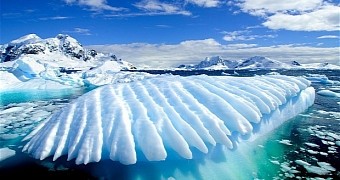An international team of researchers led by scientist Daniel Herwartz with the University of Göttingen in Germany believe to have found evidence that our entire planet froze and turned into one great snowball several times in its history.
This one time about 2.4 billion years ago, global mean temperatures dropped to an astounding -40 degrees Celsius ( -40 degrees Fahrenheit) and a layer of ice measuring an impressive 300 meters (nearly 1,000 feet) in thickness covered oceans, the specialists claim.
The scientists and his team refer to these deep freezes in our planet's history as Snowball Earth periods. They say that, in those days, landscapes around the equator and the tropics probably looked just like the Arctic and Antarctica do these days.
In case anyone was wondering, the annual mean temperature around the tropics in this day and age is one of about 30 degrees Celsius (85 degrees Fahrenheit). So, yeah, it looks like this bit of our planet is all too familiar with climate extremes.
“To imagine places like Egypt or Florida with mean annual temperatures of minus 40 degree Celsius is just mind-boggling, but that is what the data suggests,” University of Göttingen researcher Daniel Herwartz commented on his and his team's find in an interview.
How do they know how cold it was so long ago?
The scientists behind this study base their claim that our planet became a great big snowball on several occasions throughout its history on data obtained while studying the makeup of ancient rocks collected from sites in present-day China and Russia.
These rocks, whose parent patches of land once sat close to the equator, show signs of interactions with glacier meltwater. Based on their chemical profile, the scientists identified the Snowball Earth period that happened 2.4 billion ago and another that played out 700 million years back.
Although freakishly cold itself, it looks like the Snowball Earth period that specialist Daniel Herwartz and his colleagues suspect happened 700 million years ago seemed merely chilly when compared to the one that engulfed our planet 2.4 billion years ago.
The researchers cannot say how and why these cold snaps came to happen. Still, they believe that the oldest of the two Snowball Earth periods they documented was due to the fact that, in those days, our planet was home to just one big continent dubbed Rodinia.
Thus, they suspect that, being as massive as it was, this ancient continent reflected just enough heat to cause global temperatures to plummet. The fact that the Sun was fainter in those days likely had a say in the matter as well, the specialists go on to argue.

 14 DAY TRIAL //
14 DAY TRIAL //